|
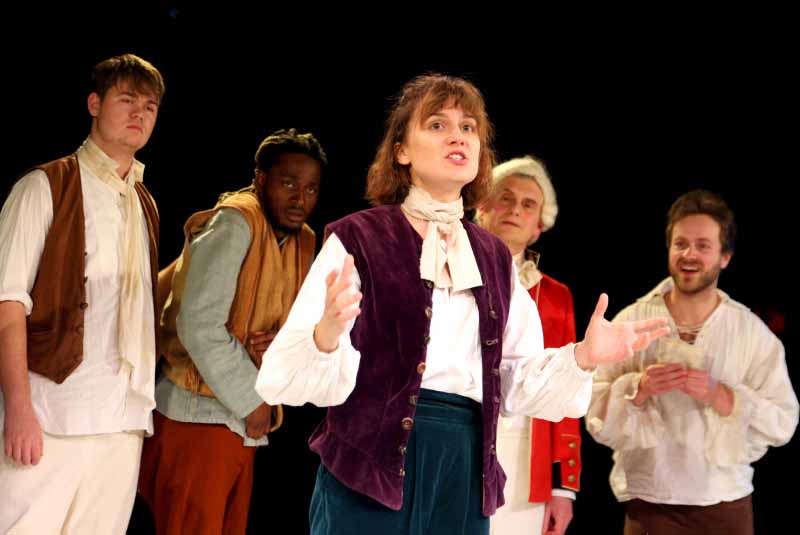 Plays about the art and process of making a play are always going to be fascinating to members of a theatre company. It’s a shared experience we all have as members of Tower Theatre whether it be acting, directing, engaging with the creative and technical elements, stage managing, working front of house or even just being part of an audience. Just how does this magical thing which makes up a show come together? Shakespeare recognised this when he invented the mechanicals and their attempt to perform Pyramus and Thisbe at the culmination of A Midsummer Night’s Dream. The process is also examined in Sheridan’s The Critic. In more recent times Noises Off (currently enjoying another West End revival) has been the last word on the fraught business of putting together a piece of entertainment. All three of these examples, of course, are concerned with comic effect but for a more serious take on the power of playmaking to both transform and redeem, one need look no further than Timberlake Wertenbaker’s Our Country’s Good. The correct terminology for this play within a play structure is, apparently, mise en abyme. Literally this translates as "placed into abyss", a situation which many of the characters of the piece have to face head on with 18th century society’s regime of brutal punishments, banishment from home, exclusion and moral/religious retribution. Plays about the art and process of making a play are always going to be fascinating to members of a theatre company. It’s a shared experience we all have as members of Tower Theatre whether it be acting, directing, engaging with the creative and technical elements, stage managing, working front of house or even just being part of an audience. Just how does this magical thing which makes up a show come together? Shakespeare recognised this when he invented the mechanicals and their attempt to perform Pyramus and Thisbe at the culmination of A Midsummer Night’s Dream. The process is also examined in Sheridan’s The Critic. In more recent times Noises Off (currently enjoying another West End revival) has been the last word on the fraught business of putting together a piece of entertainment. All three of these examples, of course, are concerned with comic effect but for a more serious take on the power of playmaking to both transform and redeem, one need look no further than Timberlake Wertenbaker’s Our Country’s Good. The correct terminology for this play within a play structure is, apparently, mise en abyme. Literally this translates as "placed into abyss", a situation which many of the characters of the piece have to face head on with 18th century society’s regime of brutal punishments, banishment from home, exclusion and moral/religious retribution.
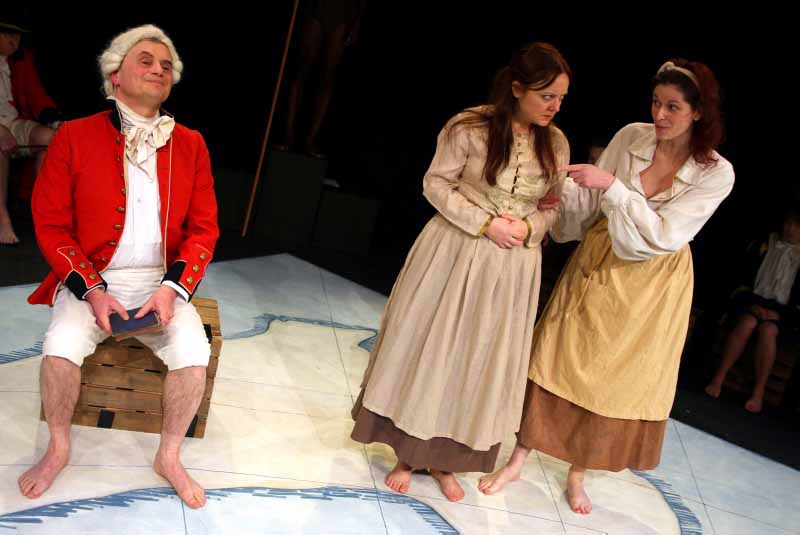 Felons transported to the newly established penal colony in New South Wales in the 1780s are dragooned into a performance of George Farquhar’s early 18th century comedy The Recruiting Officer. Under director’ Ralph Clark’s tutelage, the prisoners learn to work together as a unit forming bonds which exert a civilising influence and which even bring them closer to the military men who are their jailers. The progress of the rehearsal process both overtly and more subtly comments on the social mores of the times and makes a strong plea for why the arts continue to be important as a marker of a civilised society – current politicians please take note. And there’s an even stronger resonance in the 2020s, given our government’s insistence that it will effectively "transport" those currently deemed of no use to “our country’s good” to Rwanda. Felons transported to the newly established penal colony in New South Wales in the 1780s are dragooned into a performance of George Farquhar’s early 18th century comedy The Recruiting Officer. Under director’ Ralph Clark’s tutelage, the prisoners learn to work together as a unit forming bonds which exert a civilising influence and which even bring them closer to the military men who are their jailers. The progress of the rehearsal process both overtly and more subtly comments on the social mores of the times and makes a strong plea for why the arts continue to be important as a marker of a civilised society – current politicians please take note. And there’s an even stronger resonance in the 2020s, given our government’s insistence that it will effectively "transport" those currently deemed of no use to “our country’s good” to Rwanda.
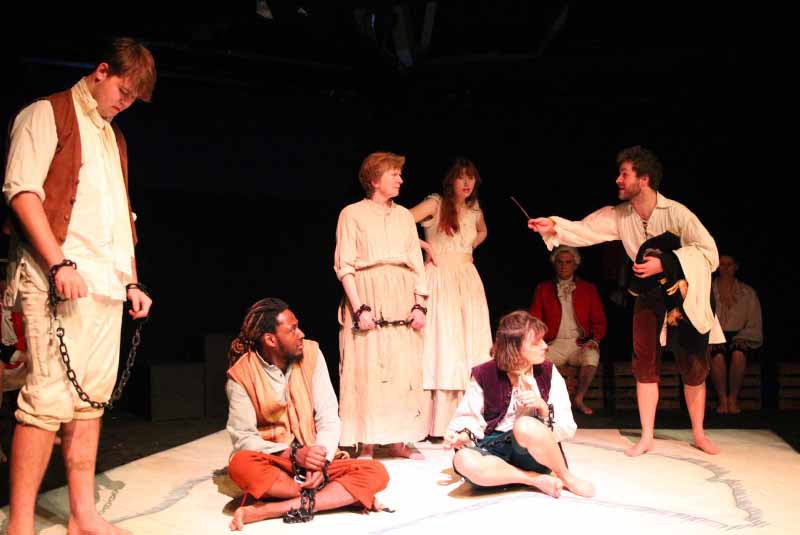 All of this goes to make Tower Theatre’s revival of this powerful piece a timely one and will no doubt have informed Peta Barker’s rehearsal process for a play about rehearsing a play which closely follows the principals of “poor theatre” of which the director is an advocate. The staging by Wendy Parry is deliberately and effectively sparse, using an essentially black box configuration with some clever lighting designed by Samuel Littley to create mood and location. Simple wooden crates are used in various arrangements to suggest the shifting locations. They also house various props which can be quickly accessed though sometimes not quickly enough - there are numerous scenes and some longueurs do occur during the transitions. As a comment on the artifice of theatre, costume changes are carried out in full view in the background; this was mostly not distracting. Anna Lindén’s costume designs stay in period and the military uniforms are particularly effective although I wasn’t totally sure why all the actors went barefoot; perhaps it had to do with a connectedness to the earth, perhaps it was another piece of commentary on the rehearsal process – at least it meant that here was no issue over the often thorny problem of period footwear. Though not often credited in reviews I’d like to give a big thumbs-up to Alexa Wall for make-up; the flogging lashes on one of the characters looked particularly horrific and genuine. All of this goes to make Tower Theatre’s revival of this powerful piece a timely one and will no doubt have informed Peta Barker’s rehearsal process for a play about rehearsing a play which closely follows the principals of “poor theatre” of which the director is an advocate. The staging by Wendy Parry is deliberately and effectively sparse, using an essentially black box configuration with some clever lighting designed by Samuel Littley to create mood and location. Simple wooden crates are used in various arrangements to suggest the shifting locations. They also house various props which can be quickly accessed though sometimes not quickly enough - there are numerous scenes and some longueurs do occur during the transitions. As a comment on the artifice of theatre, costume changes are carried out in full view in the background; this was mostly not distracting. Anna Lindén’s costume designs stay in period and the military uniforms are particularly effective although I wasn’t totally sure why all the actors went barefoot; perhaps it had to do with a connectedness to the earth, perhaps it was another piece of commentary on the rehearsal process – at least it meant that here was no issue over the often thorny problem of period footwear. Though not often credited in reviews I’d like to give a big thumbs-up to Alexa Wall for make-up; the flogging lashes on one of the characters looked particularly horrific and genuine.
 There’s a great sense of engagement from all members of the cast with most of them, as the script requires, doubling and trebling various characters. With over twenty named roles this provides economy but also enhances the theatricality of the production. Wertenbaker’s script itself gives a delightful nod to this aspect when the decision is taken that the cast will have to perform multiple roles in Farquhar’s play. Won’t this confuse the audience? the actors wonder. Not if they are paying attention replies the director. This in turn leads to the delightful exchange: There’s a great sense of engagement from all members of the cast with most of them, as the script requires, doubling and trebling various characters. With over twenty named roles this provides economy but also enhances the theatricality of the production. Wertenbaker’s script itself gives a delightful nod to this aspect when the decision is taken that the cast will have to perform multiple roles in Farquhar’s play. Won’t this confuse the audience? the actors wonder. Not if they are paying attention replies the director. This in turn leads to the delightful exchange:
"Wisehammer: What if they aren’t paying attention?
Ralph: People who can’t pay attention should not go to the theatre.
Mary: If you act well, they will have to pay attention."
Well quite, and fortunately the cast do "act well" and transition effectively between the various characters they play whether convicts or captors.
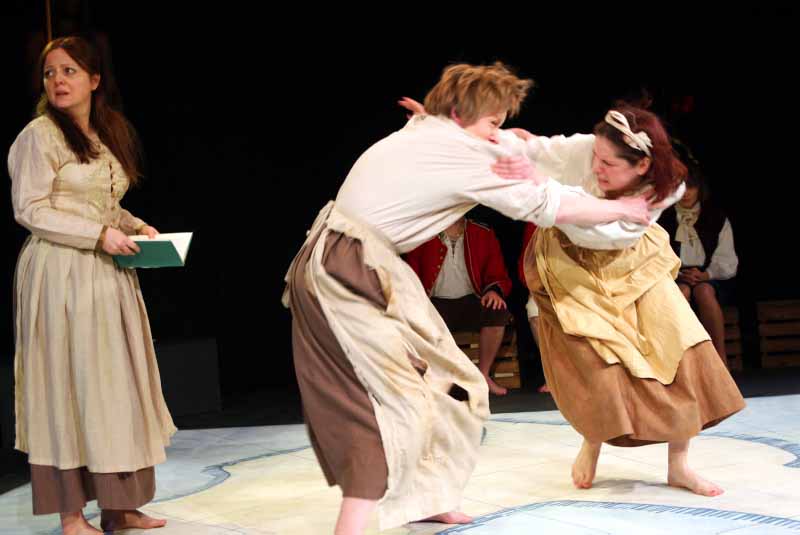 Rebecca Allan as the ultimately tragic Midshipman Harry Brewer and determinedly unaccommodating Dabby Bryant provides a pair of fine character studies which contrast well and demonstrate range. Heather Dalton is particularly impressive as a fiery Liz Morden and takes the audience with her as she wrestles with her conscience. The contrast with her appearance as Reverend Johnson is strong and well focused. Georgia Koronka’s very well delineated pair of performances (pragmatic Governor and hesitant though budding playwright) and Rebecca Hill’s trio of characters (including The Recruiting Officer’s leading lady) also stand out. There’s an impressive debut performance from Georgina Carey once again in a completely contrasting pair of roles. Holding both the play and the play within the play together is Jonathan Wober’s central turn as the nascent director. Although there is a suggestion that he takes on the project for a degree of self-advancement, Wober’s subtle performance as Clark shows the development of a social conscience and his belief in the power of a community endeavour to instil harmony and co-operation. Rebecca Allan as the ultimately tragic Midshipman Harry Brewer and determinedly unaccommodating Dabby Bryant provides a pair of fine character studies which contrast well and demonstrate range. Heather Dalton is particularly impressive as a fiery Liz Morden and takes the audience with her as she wrestles with her conscience. The contrast with her appearance as Reverend Johnson is strong and well focused. Georgia Koronka’s very well delineated pair of performances (pragmatic Governor and hesitant though budding playwright) and Rebecca Hill’s trio of characters (including The Recruiting Officer’s leading lady) also stand out. There’s an impressive debut performance from Georgina Carey once again in a completely contrasting pair of roles. Holding both the play and the play within the play together is Jonathan Wober’s central turn as the nascent director. Although there is a suggestion that he takes on the project for a degree of self-advancement, Wober’s subtle performance as Clark shows the development of a social conscience and his belief in the power of a community endeavour to instil harmony and co-operation.
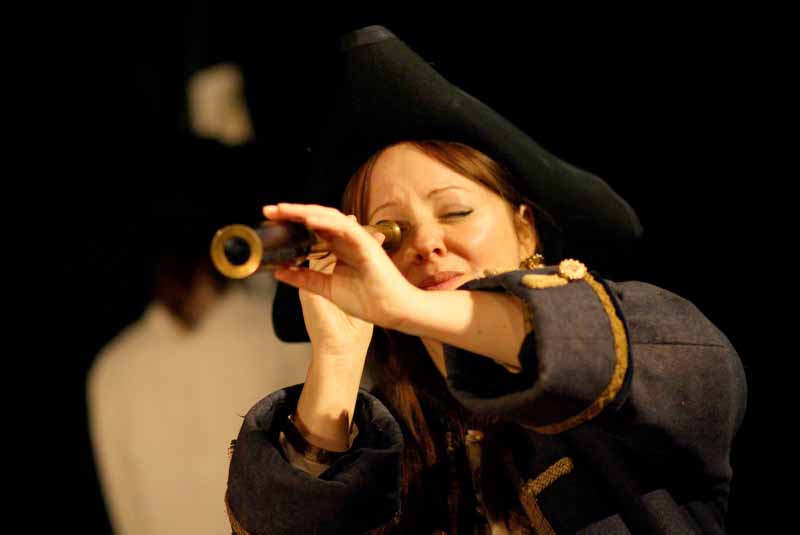 Our Country’s Good is rightfully considered a modern classic; one that reveals further facets every time it is performed and seen. It will be particularly appreciated by anyone who has been through the rehearsal process for any staged piece; it may cover events in the 1780s and been written in the 1980s but some things never change! The concerns over whether we will remember our lines and whether our characters will be convincing are a timeless constant. Will the show be ready on time? Will our audience turn up and appreciate our efforts? Will we be able to communicate the writer’s intentions and keep our work relevant? What Wertenbaker’s play and this production of it shows above all is the possibilities of the redemptive nature of theatre itself whether that be for participants or onlookers. And, just possibly, that’s one of the reasons why we all belong to a theatre company and carry on doing the work we do. As we start another new year in new Stoke Newington, bravo Peta Barker and co for such a timely reminder. Our Country’s Good is rightfully considered a modern classic; one that reveals further facets every time it is performed and seen. It will be particularly appreciated by anyone who has been through the rehearsal process for any staged piece; it may cover events in the 1780s and been written in the 1980s but some things never change! The concerns over whether we will remember our lines and whether our characters will be convincing are a timeless constant. Will the show be ready on time? Will our audience turn up and appreciate our efforts? Will we be able to communicate the writer’s intentions and keep our work relevant? What Wertenbaker’s play and this production of it shows above all is the possibilities of the redemptive nature of theatre itself whether that be for participants or onlookers. And, just possibly, that’s one of the reasons why we all belong to a theatre company and carry on doing the work we do. As we start another new year in new Stoke Newington, bravo Peta Barker and co for such a timely reminder.
Photography by David Sprecher
|





